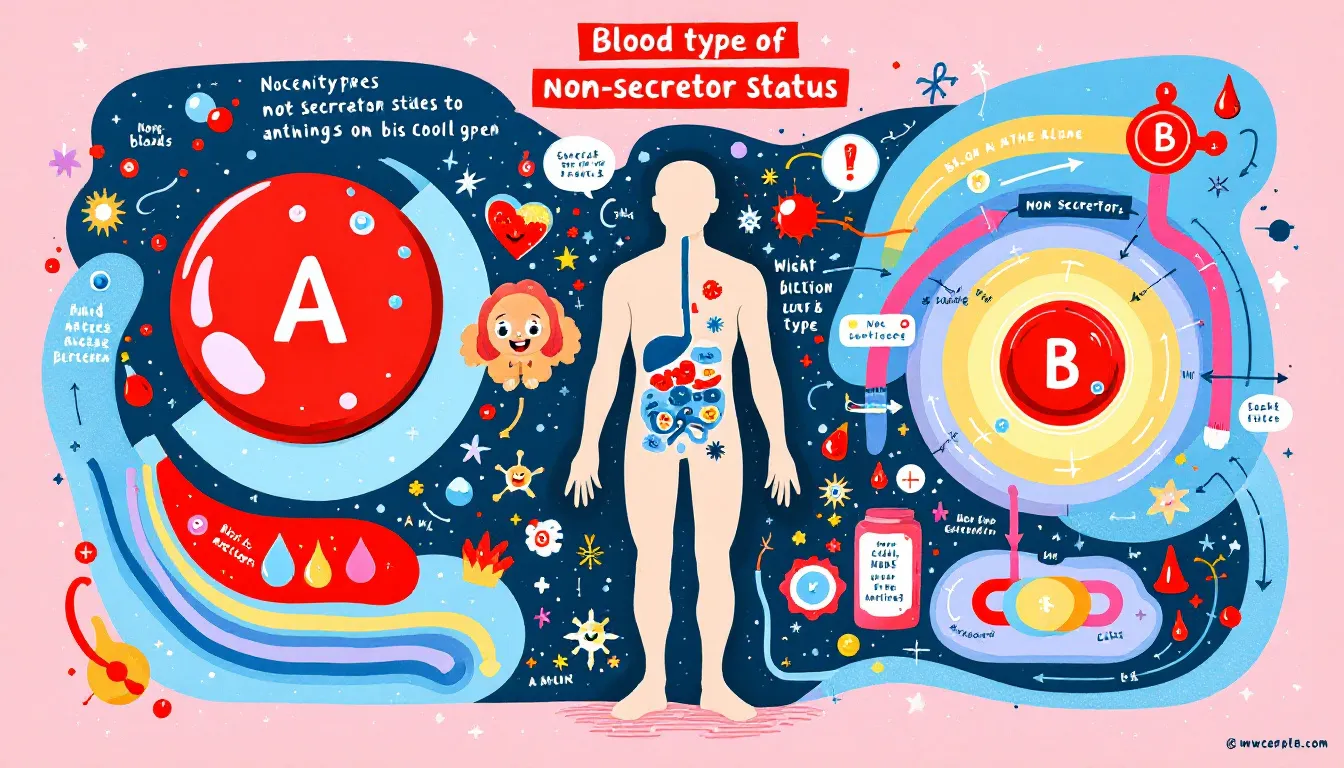Non-secretor status means you don’t release blood type antigens into body fluids, which can impact health. About 20% of people fall into this category. This article explains what non-secretor status is, its effects on health, and how to manage it.
Key Takeaways
Non-secretor status, affecting approximately 20% of the population, is determined by the FUT2 gene and influences health outcomes, including disease susceptibility and gut microbiome composition.
Non-secretors face increased risks for autoimmune diseases and digestive issues due to their inability to secrete ABO blood group antigens, but they may have resistance to norovirus infections.
Tailored dietary choices and lifestyle adjustments, including probiotic supplementation and stress management, are essential for non-secretors to maintain optimal health and mitigate associated risks.
- Get help here for secretor and non secretor problems.
What is Non Secretor Status?

Non-secretor status refers to the inability to secrete ABO blood type antigens into body fluids such as saliva, mucus, and semen. This status is determined by the presence or absence of specific genetic markers that influence whether these antigens are released into bodily fluids. Approximately 20% of the population falls into the category of non-secretors. While secretors tend to have better overall health due to their ability to release these antigens, non-secretors face unique health challenges and benefits that are worth understanding.
The difference between being a secretor or non-secretor can significantly influence various aspects of health, including gut microbiome composition, disease resistance, and nutritional needs. The key to understanding these differences lies in the genetic factors that determine secretor status, primarily the FUT2 gene, which we will explore in more detail.
The Role of the FUT2 Gene
The FUT2 gene, also known as the secretor gene, plays a crucial role in determining an individual’s secretor status. This gene is responsible for encoding an enzyme called fucosyltransferase, which facilitates the secretion of ABO blood group antigens into bodily fluids. When there is a mutation in the FUT2 gene, it disrupts this process, resulting in non-secretor status. Approximately 20% of individuals carry this mutation, making them non-secretors.
Genetic and serological testing methods can identify whether a person is a secretor or non-secretor. Cells in various body fluids, including those in the skin, mouth, airway, and digestive system, read the FUT2 gene to determine whether to secrete blood type antigens and blood types.
Understanding the role of the FUT2 gene provides valuable insights into the genetic basis of secretor status and its implications for health.
Prevalence Across Populations
Non-secretor status is not evenly distributed across all populations. In the U.S., about 20% of the population is classified as non-secretors. This prevalence is consistent across Caucasian and African populations, with both groups having a non-secretor rate of around 20%. However, the rate of non-secretors can vary significantly among different ethnic groups, with some populations exhibiting much higher prevalence rates.
Understanding the prevalence of non-secretor phenotype status across different ethnic groups is essential for identifying disease susceptibility and risk factors. For instance, genome-wide association studies and systematic reviews have shown that non-secretor status can influence disease trends within populations, highlighting the importance of personalized health management based on genetic background.
Health Implications of Being a Non Secretor

Being a non-secretor comes with a unique set of health implications. Non-secretors have a limited capability to release their blood type antigens into body fluids, which may increase their susceptibility to certain health risks. The ability to secrete blood type antigens can provide protective benefits against infections and support gut health, a luxury that non-secretors lack. As a result, non-secretors are more prone to autoimmune disorders and infections from Helicobacter pylori.
On the flip side, non-secretor status offers some protective benefits, such as resistance to norovirus infections. This section will delve into the health implications of being a non-secretor, focusing on gut microbiome differences, increased disease risks, and resistance to norovirus.
Gut Microbiome Differences
Secretor status has a significant impact on the gut microbiome. Non-secretors have low or no Bifidobacteria in their gut microbiomes, which are beneficial bacteria that play a crucial role in maintaining gut health. Research indicates that non-secretors have lower species richness among gut bacteria compared to secretors. This decreased diversity can lead to a less stable gut bacterial ecosystem, making non-secretors more susceptible to pathogenic bacteria and autoimmune diseases.
The absence of beneficial Bifidobacteria in non-secretors may contribute to their heightened risk for autoimmune diseases, as these bacteria are essential for a healthy immune response. Understanding these gut microbiome differences is crucial for tailoring dietary and probiotic interventions to support gut health in non-secretors.
Increased Risk for Certain Diseases
Non-secretor status has been linked to a higher likelihood of developing autoimmune diseases such as inflammatory bowel disease, psoriasis, and type 1 diabetes. The inability to secrete blood type antigens into body fluids increases the risk factors for various health issues, including autoimmune disorders and metabolic conditions. This increased risk can affect population health trends, leading to greater disease susceptibility among non-secretors.
Understanding these increased risk factor is essential for non-secretors to take proactive measures in managing their health. Regular monitoring and early intervention can help mitigate the impact of these conditions and improve overall health outcomes.
Resistance to Norovirus
One of the surprising benefits of being a non-secretor is the increased resistance to norovirus infections. Non-secretors exhibit lower rates of norovirus infection due to their unique intestinal glycan composition. This reduced risk extends to other gastrointestinal viruses, making non-secretors less likely to develop stomach flu and related illnesses.
The inability to express blood group antigens in the intestines provides a form of natural protection against these infections. While non-secretors face certain health challenges, this resistance to norovirus offers a significant protective benefit.
Nutritional Considerations for Non Secretors

For non-secretors, making informed dietary choices is crucial for maintaining overall health. Non-secretors may benefit from a diet rich in whole foods and low in processed items to support gut health and prevent food sensitivities. The unique composition of their gut microbiome means that non-secretors need to be particularly mindful of their nutritional intake.
This section will explore the impact of non-secretor status on vitamin B12 levels and the nutritional considerations for breastfed infants of non-secretor mothers. By understanding these factors, non-secretors can make dietary adjustments to support their health.
Impact on Vitamin B12 Levels
Non-secretors may experience impaired absorption of vitamin B12 due to changes in their gut microbiota. This impaired absorption can lead to a higher risk of vitamin B12 deficiency, which is crucial for maintaining nerve function and producing red blood cells. Regular monitoring of vitamin B12 levels is essential for non-secretors to prevent deficiencies and associated health issues.
Non-secretors should consider incorporating vitamin B12-rich foods into their diet or taking supplements to ensure adequate levels. Regular check-ups with a healthcare provider can help monitor and manage vitamin B12 levels effectively.
Breast Milk and Infant Health
Non-secretor mothers do not produce 2′-FL oligosaccharides in their breast milk, which can affect the infant’s microbiome and overall health. Breastfed babies of non-secretor mothers may experience delays in establishing a bifidobacteria-laden microbiota, essential for a healthy digestive system. This altered microbiome can have long-term health implications for infants, especially those born via C-section who lack exposure to the vaginal microbiome.
To support the health of breastfed infants, non-secretor mothers may need to provide additional dietary support, such as probiotics, to help establish a balanced microbiome. Understanding these nutritional considerations can help non-secretor mothers make informed decisions for their infant’s health.
Genetic Testing for Non Secretor Status

Genetic testing offers a reliable way to determine whether an individual is a secretor or non-secretor. Platforms like 23andMe and AncestryDNA can provide insights into your genetic background, including your secretor status. Knowing your secretor status can influence personal health decisions and dietary choices, particularly for non-secretors.
This section will guide you through the process of using these genetic testing platforms and interpreting your results, helping you understand the significance of your secretor status.
Using 23andMe and AncestryDNA
To determine your secretor status, you can check your raw data from 23andMe or AncestryDNA. Log in to your account and access your raw data, which will include information about your secretor genotype. These platforms provide a user-friendly interface to help you navigate through your genetic information.
By understanding your secretor genotype, you can make informed decisions about your health and lifestyle. Genetic testing is a valuable tool for gaining insights into your genetic makeup and how it affects your health.
Understanding Your Results
Once you have your genetic testing results, look for the genotype ‘AA’ and the rs601338 variant in the FUT2 gene to determine if you are a non-secretor. The absence of soluble ABO blood group antigens in your bodily fluids is a characteristic of non-secretors. Understanding these results can help tailor dietary and health interventions to meet your unique needs regarding ABO blood groups.
Knowing your secretor status can also influence your immune system responses and susceptibility to certain infections. By interpreting your genetic testing results, you can take proactive steps to manage your health effectively.
Managing Health as a Non Secretor

Managing health as a non-secretor involves tailored dietary and lifestyle strategies to address specific health challenges. Non-secretors may experience higher incidences of oral diseases and digestive issues, necessitating proactive health management. Incorporating a balanced diet, regular exercise, and stress management techniques can help mitigate health risks associated with non-secretor status.
This section will provide practical advice on managing health as a non-secretor, focusing on the importance of probiotics and lifestyle adjustments.
Probiotic Supplements and Foods
Probiotic supplements can play a crucial role in enhancing gut health for non-secretors. Certain probiotic strains, such as Lactobacillus rhamnosus GG and Bifidobacterium lactis, are particularly beneficial for improving gut health in non-secretors. These probiotics help replenish beneficial bacteria in the gut, which non-secretors often lack due to their unique microbiome composition.
Incorporating fermented foods rich in probiotics, like yogurt, kefir, kimchi, and sauerkraut, can be a valuable addition to the diet of non-secretors. These foods provide essential probiotics that support a healthy gut flora, helping to mitigate some of the digestive issues non-secretors may face. Including such foods in the daily diet can significantly improve gut health and overall well-being.
Lifestyle Adjustments
Non-secretors may face higher risks for certain diseases, including autoimmune disorders and cardiovascular disease, thus necessitating proactive health management. Incorporating a balanced diet rich in fruits, vegetables, and whole grains can greatly benefit non-secretors, helping to support their unique health needs.
Managing stress through techniques such as mindfulness, yoga, or regular physical activity is crucial for non-secretors, as stress can exacerbate health issues related to non-secretor status. Limiting alcohol intake and ensuring regular exercise are also key lifestyle changes recommended for non-secretors to improve health.
By adopting these lifestyle adjustments, non-secretors can better manage their health and reduce the risk of developing related conditions.
Related Topics
Understanding non-secretor status opens the door to exploring related topics that can further inform health management strategies. Non-secretor status can influence the body’s immune response and predispose individuals to various health conditions.
This section will delve into the blood type diet and the increased risk of autoimmune diseases among non-secretors, providing a broader context for understanding the implications of non-secretor status.
Blood Type Diet and Non Secretors
The blood type diet suggests dietary choices based on one’s ABO blood type, but non-secretors may require modifications to better align with their unique digestive capabilities. Non-secretors may have different dietary needs due to their unique digestive and metabolic profiles, affecting how they respond to certain foods in the blood type diet.
Individuals with non-secretor status may face challenges in following blood type diets due to their distinct digestive characteristics. It is important for non-secretors to consider these differences when adopting a blood type diet, ensuring they meet their nutritional needs effectively.
Autoimmune Disease Risks
Individuals with non-secretor status show a higher likelihood of developing autoimmune disorders, such as multiple sclerosis and rheumatoid arthritis. Research indicates non-secretors may have an elevated risk of developing autoimmune conditions such as type 1 diabetes and inflammatory bowel disease.
Understanding these increased risks is crucial for non-secretors to be proactive in their health management. Regular monitoring, early intervention, and tailored health strategies can help mitigate the impact of autoimmune diseases and improve overall health outcomes.
Summary
In summary, non-secretor status significantly impacts various aspects of health, from gut microbiome composition to disease susceptibility. Understanding the role of the FUT2 gene, the prevalence of non-secretor status across populations, and the health implications is crucial for effective health management. Non-secretors face unique challenges, including an increased risk of autoimmune diseases and impaired vitamin B12 absorption, but also enjoy certain protective benefits, such as resistance to norovirus.
By making informed dietary choices, incorporating probiotics, and adopting healthy lifestyle practices, non-secretors can better manage their health and mitigate associated risks. Genetic testing offers valuable insights into your secretor status, enabling personalized health strategies. Embracing these insights can lead to improved overall well-being and a healthier life.
Frequently Asked Questions
What is non-secretor status?
Non-secretor status refers to individuals who do not release ABO blood type antigens into bodily fluids, potentially affecting their gut health, nutrition, and disease resistance. This condition can have significant implications for overall well-being.
How can I determine if I am a non-secretor?
You can determine if you are a non-secretor by using genetic testing services such as 23andMe or AncestryDNA to check your raw data for particular genetic markers associated with secretor status.
What are the health implications of being a non-secretor?
Being a non-secretor may result in higher risks for autoimmune diseases and impaired vitamin B12 absorption, while also benefiting from a lower risk of norovirus infection. It is important to consider these health implications when evaluating one’s overall health.
How can non-secretors manage their health effectively?
Non-secretors can effectively manage their health by incorporating probiotics, maintaining a balanced diet, managing stress, and limiting alcohol intake, while also regularly monitoring their vitamin B12 levels. Implementing these strategies can lead to improved overall well-being.
Are there dietary considerations for non-secretor mothers and their infants?
Non-secretor mothers should consider dietary support, as their breast milk lacks specific oligosaccharides that can influence the infant’s microbiome. Incorporating probiotics may be beneficial for the health of breastfed infants in this situation.

